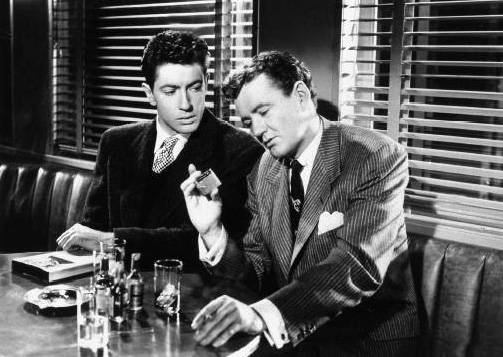Alfred Hitchcock movies are trains. They move relentlessly forward, each moment pushing the story from start to finish. Images create more images. A shot of Bruno’s tie with his name on it leads to a shot of Anne frowning, which leads a plot point down the road in which Anne confronts Guy. The world is a place in constant motion, where everything causes everything and a sense of ominous doom pervades every action. This ends up highlighting the irrational decisions people make. Bruno thinks of himself as coldly rational – or at least likes to present himself as such. He presents the murder of his father as a clear solution to an immediate problem, and his little plan of swapping murders as the most rational path to take. The story reveals that he simply enjoys murder for its own sake and getting his first taste of it has thrown him into an addiction. Meanwhile, once the plot is in motion, Guy refuses to go to the police because he’s afraid of getting fingered for the murder – and, in my read, is perhaps afraid of permanent damage to his reputation even if the case goes his way – which makes me wonder why he didn’t go to a lawyer for help, beyond that then there would be no movie. My favourite parts of Hitchcock films are the moments of uncanniness, in which we are looking at a person who holds something alien and incomprehensible within them, and to get to those points you have to use a lot of rationality.
Alfred Hitchcock movies are also trains in that he is an engineer. His works are not self-expression for him; they are, of course, driven by his choices, and he’s prone to making the same choice multiple times. As said, a fear of and contempt for police shows up in this movie, and they shoot a completely random guy that had nothing to do with anything. But his focus is on the work itself; shaping space, light, time, dialogue, and performance to turn empty space into the movie Strangers On A Train. He treats the process of creating a single movie with the same attitude that a plumber is supposed to treat a broken toilet. Something I think about a lot is that I have a friend who has gone through miscarriages, bad relationships in which his children were separated from him, the tragic loss of family members are a young age – both when he was young and when they were young – and yet nobody asks him if the truck he drove for work that day is an expression of that pain and his self-identity even though it absolutely, 100% is. Like, the way he lives now is a kind of redemptive action for things he did and saw when he was younger. Conversely, I’ve found that creating art with Hitchcock’s plumber attitude is a lot more conducive to making good art than treating it as something romantic.
It’s almost a feedback loop, isn’t it? The lack of respect for the arts from the outside – treating it as an impractical endeavour with no Usefulness – seems to reinforce that perception from artists, who treat what they do as a spiritual communion with God or the universe or whatever. But maybe it’s better off to see it the other way around – that banal every-day life is the spiritual communion and it’s art that’s the work to get us there. One thing that bothers me about art in This Day And Age is that so much of it is trying so hard to be a deeply spiritual experience and so little of it lands for me. I look back and its the mechanically written stuff that speaks to me; not always but often the artists cranking out Work than the people who were spiritual archetypes, or the spiritual archetypes did a lot of Work to get where they are. It is possible to be one of those Romantic archetypes – a Scientist, a Historical Document, a Chief Whip, a Bad Motherfucker – but you don’t really get to pick which one because they come as a side effect of action. I can see why Hitchcock wasn’t really respected as an Artist in his time and why those French dudes came to him in the Sixties. He was a singular individual and it took a lot of action to see that.

